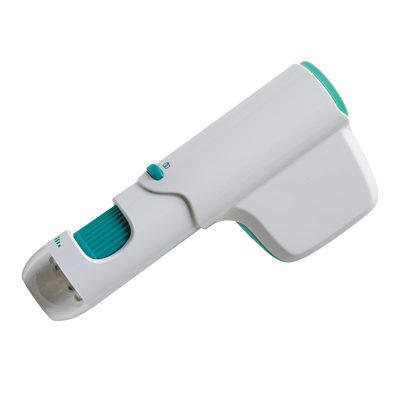WiFi Microscope
By Edwin P. Christmann
Posted on 2015-11-02
The WiFi Microscope facilitates STEM education (Science, Technology, Engineering, Mathematics) by enabling small or large groups of students to participate microscope investigations by sharing images and videos on their connected smartphones and tablets. The WiFi Microscope can be used with both iOS and Android operating systems. The WiFi Microscope features adjustable LED lights, a camera for capturing still images and videos, and a 80X magnification zoom option. The device requires three AA batteries, which are included. Each WiFi microscope can connect with three users that are within ten meters of the device, which should provide coverage to all students in a typical classroom.
Before images can be shared remotely on tablets or smartphones, the Wi-Viewer app needs to be installed on each device. The app is available through the iOS app store and Android’s Google Play app store.
https://itunes.apple.com/us/app/wi-viewer/id588252158?mt=8
https://play.google.com/store/apps/details?id=com.elansat.wiviewer
You’ll also need to sync the WiFi Microscope to each device by following the simple instructions provided. Once the Wi-Viewer is connected, the image seen by the microscope can be shared with each smart device connected. Still images and videos can be captured using a button on the front of the WiFi Microscope. Lighting and magnification can also be adjusted using controls on the camera. Here is a video of the microscope being used:
[youtube]https://youtu.be/HUFwU7ggtvk[/youtube]
The WiFi Microscope offers many opportunities for students to engage in online, collaborative microscope investigations. I found the device to be a user friendly tool that engages students in technology-based inquiry by linking a piece of lab equipment with devices that have become part of their everyday lives.
Estimated Cost:
$787.80
Specifications:
http://www.califone.com/pdf/spec_sheets/CM2W_Spec.pdf
Edwin P. Christmann is a professor and chairman of the secondary education department and graduate coordinator of the mathematics and science teaching program at Slippery Rock University in Slippery Rock, Pennsylvania, Karlie Comfort is a graduate student and a research assistant in the mathematics and science teaching program at Slippery Rock University in Slippery Rock, Pennsylvania, and Mary Karavias is a graduate student and a research assistant in the secondary education program at Slippery Rock University in Slippery Rock, Pennsylvania.
Disclaimer: The views expressed in this blog post are those of the author(s) and do not necessarily reflect the official position of the National Science Teaching Association (NSTA).



